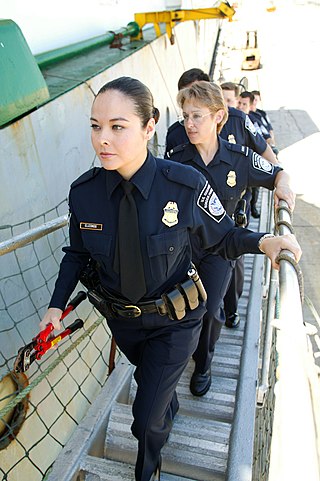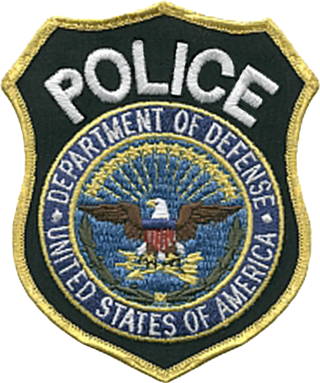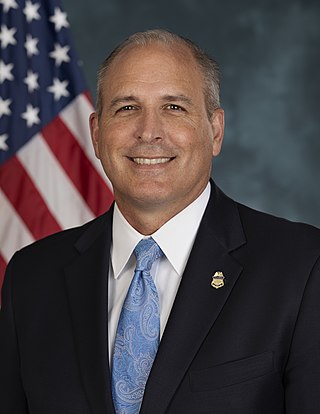Related Research Articles
U.S. Immigration and Customs Enforcement is a federal law enforcement agency under the U.S. Department of Homeland Security. ICE's stated mission is to protect the United States from cross-border crime and undocumented immigration that threaten national security and public safety.

The United States Border Patrol (USBP) is a federal law enforcement agency under the United States Customs and Border Protection (CBP) and is responsible for securing the borders of the United States. According to its web site in 2022, its mission is to "Protect the American people, safeguard our borders, and enhance the nation’s economic prosperity."

The United States Customs Service was a federal law enforcement agency of the U.S. federal government. Established on July 31, 1789, it collected import tariffs, performed other selected border security duties, as well as conducted criminal investigations.

United States Customs and Border Protection (CBP) is the largest federal law enforcement agency of the United States Department of Homeland Security. It is the country's primary border control organization, charged with regulating and facilitating international trade, collecting import duties, as well as enforcing U.S. regulations, including trade, customs and immigration. CBP is one of the largest law enforcement agencies in the United States. It has a workforce of more than 45,600 federal agents and officers. It is headquartered in Washington, D.C.

The Federal Protective Service (FPS) is a federal law enforcement agency of the United States Department of Homeland Security (DHS). It is also "the federal agency charged with protecting and delivering integrated law enforcement and security services to facilities owned or leased by the General Services Administration (GSA)"—over 9,000 buildings—and their occupants.

The Federal Law Enforcement Training Centers serves as an interagency law enforcement training body for 105 United States government federal law enforcement agencies. The stated mission of FLETC is to "...train those who protect our homeland". Through the Rural Policing Institute (RPI) and the Office of State and Local Training, it provides tuition-free and low-cost training to state, local, campus and tribal law enforcement agencies.

A police academy, also known as a law enforcement training center, police college, or police university, is a training school for police cadets, designed to prepare them for the law enforcement agency they will be joining upon graduation, or to otherwise certify an individual as a law enforcement officer, typically a police officer.

Air and Marine Operations (AMO) is a federal law enforcement component within U.S. Customs and Border Protection (CBP), an agency of the United States Department of Homeland Security (DHS). AMO's mission is to protect the American people and nation's critical infrastructure through the coordinated use of air and marine assets to detect, interdict and prevent acts of terrorism and the unlawful movement of people, illegal drugs, and other contraband toward or across the borders of the United States. Air and Marine Operations Agents and Officers are endowed with the authority to enforce Title 8 and Title 19 (Customs) of the United States Code in addition to the general law enforcement powers bestowed upon federal law enforcement agents.

William Ralph Basham Jr. is an American law enforcement official who served as commissioner of U.S. Customs and Border Protection, director of the United States Secret Service, director of the Federal Law Enforcement Training Centers, and chief of staff of the Transportation Security Administration.

The Border Patrol Tactical Unit (BORTAC) is the tactical unit of the United States Border Patrol. In 2007, BORTAC was placed under the command of the newly formed Special Operations Group (SOG) together with the Border Patrol Search, Trauma, and Rescue Unit (BORSTAR).

The Under Secretary for Terrorism and Financial Intelligence is a position within the United States Department of the Treasury responsible for directing the Treasury's efforts to cut the lines of financial support for terrorists, fight financial crime, enforce economic sanctions against rogue nations, and combat the financial support of the proliferation of weapons of mass destruction. The Under Secretary is appointed by the President and confirmed by the Senate.
The Livermore Sector of the Border Patrol was dismantled in 2004. This was part of a shift of Border Patrol enforcement away from the interior and to the border.

The federal government of the United States empowers a wide range of federal law enforcement agencies to maintain law and public order related to matters affecting the country as a whole.

The College of Artesia was a private liberal arts college that operated from 1966 to 1973 in Artesia, New Mexico. It was one of several colleges established by local civic leaders with the support and encouragement of Parsons College in Fairfield, Iowa. These Parsons "satellite schools" were by-products of the strong growth and apparent success of Parsons during the late 1950s and early 1960s, and all followed the "Parsons Plan" academic model developed at that school. None of the schools, however, was ultimately successful.

United States Department of Defense Police are the uniformed civilian security police officers of the United States Department of Defense (DoD), various branches of the United States Armed Forces, or DoD agencies.
The U.S. National Park Service has a long history of specialized training needs. One of the service's earliest training programs was Ranger Skills, a nine-week course held at the Grand Canyon. Over the years, the variety of skills has increased and the bureau has created training centers to meet those needs.

The Bureau of Indian Affairs Police, Office of Justice Services, also known as BIA Police, is the law enforcement arm of the United States Bureau of Indian Affairs. The BIA's official mission is to "uphold the constitutional sovereignty of the Federally recognized Tribes and preserve peace within Indian country". It provides police, investigative, corrections, technical assistance, and court services across the over 567 registered Indian tribes and reservations, especially those lacking their own police force; additionally, it oversees tribal police organizations. BIA services are provided through the Office of Justice Services Division of Law Enforcement.

Mark A. Morgan is an American law enforcement official who served as the Chief Operating Officer and acting Commissioner of U.S. Customs and Border Protection from July 5, 2019, to January 20, 2021.
Family detention is the detention of multiple family members together in an immigration detention context. In the U.S. they are referred to as family detention camps,family detention centers, or family detention facilities.

National Park Service Law Enforcement Rangers are uniformed federal law enforcement officers with broad authority to enforce federal and state laws within National Park Service (NPS) sites. The National Park Service commonly refers to law enforcement operations in the agency as Visitor and Resource Protection. In units of the National Park System, law enforcement rangers are the primary police agency. The National Park Service also employs special agents who conduct more complex criminal investigations. Rangers and agents receive extensive police training at the Federal Law Enforcement Training Centers and annual in-service and regular firearms training.
References
- 1 2 Hauslohner, Abigail (November 23, 2018). "On the front lines of a political battle: The Border Patrol Academy is training its newest recruits to work in a particularly hostile environment". The Washington Post. Retrieved July 27, 2019.
- ↑ Yurkevich, Vanessa (August 11, 2018). "Training to be a Border Patrol agent in the age of Trump". CNN. Retrieved July 28, 2019.
- ↑ "CBP Border Patrol Academy: What information is there about the Border Patrol Agent Academy?". U.S. Customs and Border Protection. Retrieved March 10, 2020.